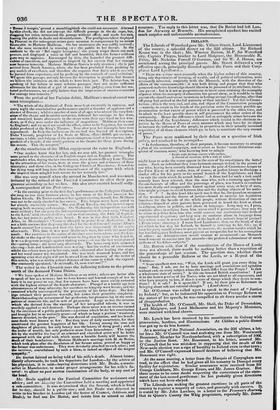IRELAND.
The Liberals of Waterford gave Mr. Villiers Stuart, Lord. Lieutenant
of the county, a splendid dinner on the 22d ultimo. Sir Richard Keane was in the chair; Mr. Winston Barron, N.P. for Waterford city, Captain Phipps, brother to Lord Mulgrave, the Honourable R. Petre, Mr. Nicholas Purcell O'Gorman, and Sir W. J. Honan, are mentioned among the principal guests. Mr. Stuart delivered a very effective speech, principally directed against the Peers and their Cory- Owns Lord Lyndhurst- " There wai a time most aseureilly when the higher orders of this country, being sole depositaries of learning, of wealth, and of political information, were necessarily intrusted, conjointly with the Monarch, with the direction of the affairs of the commonwealth : it was both fitting and proper that they who possessed exclusive knowledge should likewise be possessed of its attribute, exclu- sive poser : but is it not as preprosterous to insist upon retaining the monopoly of power when the lllll nupoly of education has passed away, as it would be in that parent who should endeaveur to restrain in leading-strings his offspring, after that offpring hall arrived at the full maturity of their intellect? Yet this is Conser- vatism—this is the very end, and aim, and object of the Conservative principle —namely, to ietain in the hands of the patrician order the nearest possible ap- proximation to that extent of power which it possessed in the olden time, and to admit to the least possible share in self-government the other orders of the community. Hence the differences which had so unhappily arisen between the two branches of the Legislature; differences which consist in the obstinate re- jection by the }louse of Peers of every measure which may have for its object to increase the influence of the people, in proportion to their actually increased aisplisitian of all those elements which go, in fact, to constitute the very essence of power."
The Peers were maddened by their defeat on a question of Irish policy, and resolved to be revenged-
" In furtherance, therefore, of their purposes, it became necessary to arrange a plan of the sessional campaign, and to select as leader ' some illustrious Con- queror of common sense,' who knowing how to mingle
• Tenth a ith fiction, siwers with smiles, A thread of candour, with a web of wiles:
might hope to make the worse appear in the eyes of his countrymen the better cause. Such an individual they were fortunate enough to find, in the person of one who, having been recently dismissed from the post of Conscience-keeper to the First Et ate of the realm, was, of course, at perfect leisure to discharge a similar office for his party in the second branch of the Legislature, and thus to rule the circle which he served before.' A fitter tool for such a task could scarcely have been selected, than the man who, with a ravening appetite for the enioluments of office and the patronage of place, was known to combine the most deadly and unappeasable hatred against every man, or leafy of men, who might presume to stand between him anal the darling objects of his ambi- tion. "1 * In this fiend. like spirit was it that he, the quondam occupant of the woolsack and the throne of justice—bound to exercise his legislative functions for the benefit of the whole people, without distinction of race or religion—Metall of alien parents born, presumed to brand the Irish as aliens in religion, aliens in polities, and aliens in language. Long may we, I pray, continue alieee in leligion fiorn him whose creed is persecution ; long may we be aliens in pelitics from him who could convert our institutitnis into fields of experimental despatistn ; and long may we continue aliens in language from labia whose voice is never heard but as the knell of a nation's hope of justice .1. ( Tremendous cheering. ) I warn Lord Lyndhurst, that, on the brink of that pit which he has due for Ireland, he himself is tottering to his fell ; ay, if even his party should return to plover to-morrow, the wanton insults which lie has levelled against Irishmen must pi esent an insuperable bar to his resumption of office: no Administration would venture to recommend—no Monarch woubl consent to receive into his cuunsels—the professed calumniator of seven millions of his fellow-subjects." Mr. Barron said, that if the constitution of the House of Lords were not altered, there would be nothing better than a repetition of the proceedings of last session. The question was, whether there should he a peaceable Reform or the Lords, or a Repeal of the Union— Statue excellent men say, Wait, the Lords will grant you every thing in time.' But, I ask, are we to have meetings and associations and agitation without end, on every subject where the Lords differ from the People? -Is this a wholesome state of society ? Is this our boasted British constitution! I put it to the honest portian of the Tories, who are not blind to all experience, and who have property to lose, if this is a state of things which they desire to con- tinue? Is it safe ? Is it agreeable? If not, let them join us Reformers in bringing about safe and rational changes." (Loud cheers. )
Mr. O'Gorman was called upon to speak to the toast of " Justice to Ireland ;" but, as he intimated his opposition to Peerage Reform at the outset of his speech, he was compelled to sit down amidst a storm of disapprobation.
The health of Mr. O'Connell, Mr. Shell, the Duke of Devonshire, Lord Mulgrave, and Loid Melbourne and his Majesty's Ministers, were received with loud cheers.


























 Previous page
Previous page